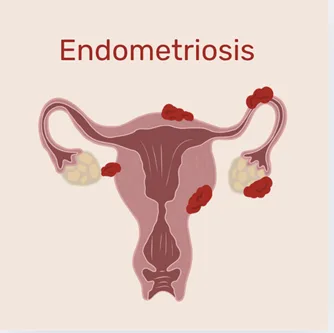Is Endometriosis a Mitochondrial Disease?
Published December 2024
Millions of women worldwide suffer from endometriosis, a chronic illness that is complicated and sometimes misdiagnosed. According to recent studies, mitochondrial dysfunction might be a key factor in the onset and progression of the condition. The connection between endometriosis and mitochondria is examined in this article, along with the possibility of improving symptoms and results by focusing on mitochondrial health.
What Is Endometriosis
When tissue that resembles the endometrium, the lining of the uterus, grows outside of it, it is known as endometriosis.
Scarring, discomfort, and inflammation may result from this displaced tissue. Women of reproductive age are the condition’s main victims, and infertility is frequently linked to it.
Common symptoms of Endometriosis

Symptoms of endometriosis can vary widely; however, common signs include:
- Pelvic pain, especially during menstruation
- Pain during intercourse
- Heavy menstrual bleeding or irregular periods
- Fatigue
- Infertility
- Gastrointestinal issues like bloating, constipation, or diarrhea
- Back pain
- Painful urination or bowel movements, particularly during periods
- Nausea and vomiting
- Chronic fatigue
The possible link between endometriosis and mitochondrial health is highlighted by the fact that it can also present as systemic symptoms as immunological dysfunction and inflammation.
Role of Mitochondria in Endometriosis
The vital organelles called mitochondria are in charge of generating adenosine triphosphate (ATP), which is the source of energy. To preserve cellular health, they also control the pathways leading to oxidative stress and cell death.
According to recent research, a key factor in the pathogenesis of endometriosis is mitochondrial malfunction.
- Mitochondrial Dynamics: the processes of mitochondrial fission and fusion—collectively referred to as mitochondrial dynamics—are disturbed. Unbalanced dynamics contribute to the growth and invasiveness of endometriotic cells by increasing oxidative stress and impairing cellular energy production.
- Energy Production and Oxidative Stress: Endometrial cells produce less ATP when there is mitochondrial malfunction. Cellular function is impacted by this energy shortfall, which can also make inflammation worse. Moreover, oxidative stress is exacerbated by malfunctioning mitochondria’s increased generation of reactive oxygen species (ROS), which harms nearby tissues and feeds the inflammatory cycle.
- Genomic Variations: People with advanced-stage endometriosis have been found to have changes in their mitochondrial DNA (mtDNA). Further connecting mitochondrial health to disease severity, these genetic alterations may make people more vulnerable to oxidative stress and disrupt mitochondrial function.
Mitochondrial oxidative stress and inflammation in Endometriosis
Endometriosis is characterized by oxidative stress, which is mostly regulated by mitochondria. Excess ROS are released by dysfunctional mitochondria, which destroys cellular components and sets off inflammatory pathways. By lowering egg quality and endometrial receptivity, this chronic inflammatory milieu not only exacerbates symptoms like fatigue and pelvic pain but also plays a role in infertility.
Endometriosis and mitochondrial DNA: links to pain and inflammation
Variations in mitochondrial DNA (mtDNA) have been linked to endometriosis’s painful and inflammatory symptoms. A higher inflammatory response is associated with specific mtDNA haplogroups, which exacerbates the pain and immunological dysregulation that are hallmarks of the illness.
These results point to a possible genetic foundation for patient-to-patient variation in symptoms.
Improving mitochondrial health for symptom relief
A promising strategy for treating endometriosis is to focus on mitochondrial health. Among the methods to promote mitochondrial function are:

Dietary Interventions
- Foods rich in antioxidants, such as berries, leafy greens, and nuts, can neutralize ROS and reduce oxidative stress.
- Omega-3 fatty acids, found in fish like salmon, have anti-inflammatory properties.
- Moderate aerobic exercise enhances mitochondrial biogenesis and reduces inflammation.
- Activities like yoga or Pilates may also help alleviate pain and improve flexibility.
- Prioritizing sleep, reducing stress, and avoiding environmental toxins can mitigate systemic inflammation and improve overall mitochondrial health.
The growing body of research linking mitochondria to endometriosis highlights the critical role these organelles play in the condition’s progression and symptomatology. Targeting mitochondrial dysfunction as part of a comprehensive treatment strategy offers a promising path forward.
By improving mitochondrial health through dietary changes, exercise, stress management, and the use of targeted supplements, individuals with endometriosis may experience symptom relief and enhanced quality of life.
References
- Kobayashi H, Imanaka S, Yoshimoto C, Matsubara S, Shigetomi H. Molecular mechanism of autophagy and apoptosis in endometriosis: Current understanding and future research directions. Reprod Med Biol. 2024; 23:e12577. https://doi.org/10.1002/rmb2.12577
- Kobayashi H, Matsubara S, Yoshimoto C, Shigetomi H, Imanaka S. The role of mitochondrial dynamics in the pathophysiology of endometriosis. J Obstet Gynaecol Res. 2023; 49(12): 2783–2791. https://doi.org/10.1111/jog.15791
- Hsu AL, Townsend PM, Oehninger S, Castora FJ. Endometriosis may be associated with mitochondrial dysfunction in cumulus cells from subjects undergoing in vitro fertilization-intracytoplasmic sperm injection, as reflected by decreased adenosine triphosphate production. Fertil Steril. 2015 Feb;103(2):347-52.e1. doi: 10.1016/j.fertnstert.2014.11.002. Epub 2014 Dec 13. PMID: 25516080.
- Chaolu Chen, Yong Zhou, Changchang Hu, Yinfeng Wang, Zhuqing Yan, Zhi Li, Ruijin Wu. Mitochondria and oxidative stress in ovarian endometriosis, Free Radical Biology and Medicine, Volume 136, 2019, Pages 22-34, ISSN 0891-5849, https://doi.org/10.1016/j.freeradbiomed.2019.03.027
- Atkins, H.M., Bharadwaj, M.S., O’Brien Cox, A. et al. Endometrium and endometriosis tissue mitochondrial energy metabolism in a nonhuman primate model. Reprod Biol Endocrinol 17, 70 (2019). https://doi.org/10.1186/s12958-019-0513-8
- Ye C, Chen P, Xu B, Jin Y, Pan Y, Wu T, Du Y, Mao J, Wu R. Abnormal expression of fission and fusion genes and the morphology of mitochondria in eutopic and ectopic endometrium. Eur J Med Res. 2023 Jul 1;28(1):209. doi: 10.1186/s40001-023-01180-w. PMID: 37393390; PMCID: PMC10314411.
- Asally R, Markham R, Manconi F. Mitochondrial DNA haplogroup H association with endometriosis and possible role in inflammation and pain. Journal of Endometriosis and Pelvic Pain Disorders. 2020;12(3-4):158-164. doi:10.1177/2284026520940518



